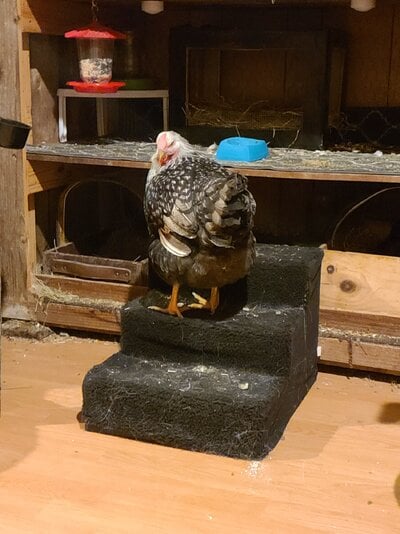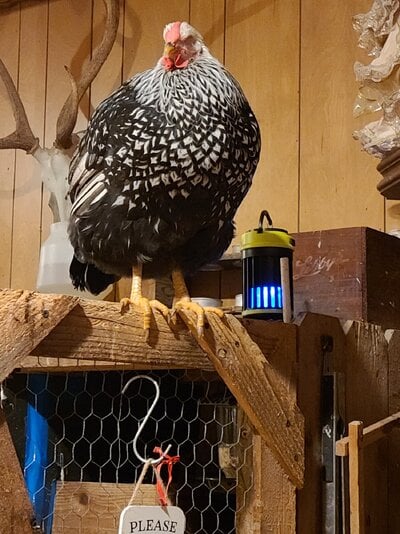Mason Farm and Ranch
Songster
Like most backyard chickens keeps, it has been a bit of a disappointment to find out how much misinformation about chicken keeping there is out there.
I love my girls and I weep openly every time I lose one. My learning years have been harsh and heartbreaking, but my refusal to accept culling being an only option has been fruitful. I hope what I have recently discovered proves useful.
I was losing chickens. They'd be fine one day and dead the next. I have a rotating regimen of worming, pest control, protazoa abatement and bi-weekly, hands on exams. Still, fine one day, dead the next.
Like a good chook mom, all my girls are vaccinated. Turns out, that may not be so good. I recently read on BYC that the Marek's vaccine really does nothing useful. It does not prevent the transmission or contracting the virus, nor does it prevent the development of the disease. (Having the virus or the disease are 2 different things).
All the vaccine does is suppress symptoms. So if your chooks have the virus and develop the disease, they pretty much die without you knowing what killed them.
Every article I had read up to that point said there is no cure, no treatment, the most humane thing you can do is cull the bird to keep them from an agonizing death.
Well, I don't accept that. Marek's is a virus. Viruses have treatments. So I went hunting. Turns out that not only am I right, I'm not the only one giving the traditional data side-eye.
I found several clinical studies and a white paper out of China discussing several chicken viruses and the use of Chinese Skullcap. You can read two of the clinical studies on poultrydmv.org.
It basically rolled down to the herb Having the ability to shut the virus off, returning it to its dormant stage. They tested it with success on Marek's, Avian Flu and Mycoplasma Gallisepticum a/k/a Bubbleye (CRD).
A compilation of this single symptoms my chickens were exhibiting pointed to Marek's Disease. One had wing paralysis, two were limping, egg production was down, pale combs, ruffled feathers and weight loss was abundant and my boss hen, a Silver Wyandotte named Rogue, developed a cataract, she was going blind. I thought they were all soon to be dead.
I read on. 80% of fowl carry the Marek's virus. It mutates and can become quite deadly. But for the most part, it remains dormant. Birds carrying the virus, spread the virus.
So if 80% of fowl carry the virus and the standard recommendation is to cull the birds, wouldn't that wipe out the fowl population? It seems a tad counter productive. Ya think?
I found the clinical studies and poultrydmv.org confirmed my findings of 425mg, one time daily but no length of treatment is given. I went with 3 days.
Rouge was first in line. 425mg for 3 days. Then I decided to repeat in a week.
That was a month ago. Rogue is returning to normal. No longer a complacent lump, she's making rounds and kicking cloacas.
My other birds are recovering. I'm still treating the non-symptomatic birds.
I hope this is helpful.
https://www.ncbi.nlm.nih.gov/pmc/articles/PMC8463782/
Antiviral effect of baicalin on Marek's disease virus in CEF cells:
https://doi.org/10.1186/s12917-020-02595-x
I love my girls and I weep openly every time I lose one. My learning years have been harsh and heartbreaking, but my refusal to accept culling being an only option has been fruitful. I hope what I have recently discovered proves useful.
I was losing chickens. They'd be fine one day and dead the next. I have a rotating regimen of worming, pest control, protazoa abatement and bi-weekly, hands on exams. Still, fine one day, dead the next.
Like a good chook mom, all my girls are vaccinated. Turns out, that may not be so good. I recently read on BYC that the Marek's vaccine really does nothing useful. It does not prevent the transmission or contracting the virus, nor does it prevent the development of the disease. (Having the virus or the disease are 2 different things).
All the vaccine does is suppress symptoms. So if your chooks have the virus and develop the disease, they pretty much die without you knowing what killed them.
Every article I had read up to that point said there is no cure, no treatment, the most humane thing you can do is cull the bird to keep them from an agonizing death.
Well, I don't accept that. Marek's is a virus. Viruses have treatments. So I went hunting. Turns out that not only am I right, I'm not the only one giving the traditional data side-eye.
I found several clinical studies and a white paper out of China discussing several chicken viruses and the use of Chinese Skullcap. You can read two of the clinical studies on poultrydmv.org.
It basically rolled down to the herb Having the ability to shut the virus off, returning it to its dormant stage. They tested it with success on Marek's, Avian Flu and Mycoplasma Gallisepticum a/k/a Bubbleye (CRD).
A compilation of this single symptoms my chickens were exhibiting pointed to Marek's Disease. One had wing paralysis, two were limping, egg production was down, pale combs, ruffled feathers and weight loss was abundant and my boss hen, a Silver Wyandotte named Rogue, developed a cataract, she was going blind. I thought they were all soon to be dead.
I read on. 80% of fowl carry the Marek's virus. It mutates and can become quite deadly. But for the most part, it remains dormant. Birds carrying the virus, spread the virus.
So if 80% of fowl carry the virus and the standard recommendation is to cull the birds, wouldn't that wipe out the fowl population? It seems a tad counter productive. Ya think?
I found the clinical studies and poultrydmv.org confirmed my findings of 425mg, one time daily but no length of treatment is given. I went with 3 days.
Rouge was first in line. 425mg for 3 days. Then I decided to repeat in a week.
That was a month ago. Rogue is returning to normal. No longer a complacent lump, she's making rounds and kicking cloacas.
My other birds are recovering. I'm still treating the non-symptomatic birds.
I hope this is helpful.
https://www.ncbi.nlm.nih.gov/pmc/articles/PMC8463782/
Antiviral effect of baicalin on Marek's disease virus in CEF cells:
https://doi.org/10.1186/s12917-020-02595-x
| Baicalin (Scutellaria baicalensis) extract | 100-200 mg/kg of diet | F Yang et al., 2020; Y Zhou et al., 2019; B Yin et al., 2021; M Bao et al., 2022; Z Hu et al., 2022 |





